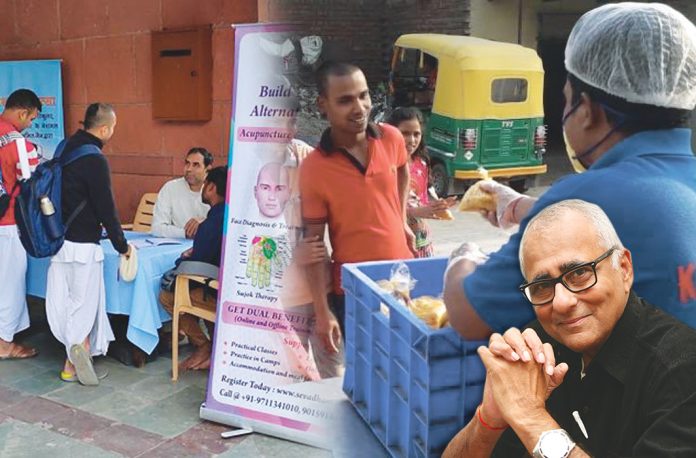On the bank of the Yamuna, in the middle of an obscure biodiversity park opposite Delhi’s once bustling pre-Covid Sarai Kale Khan lies an Ayurvedic healing centre—Seva Dham Plus—run by Jains and monks of the charitable Manav Mandir Mission.
It is an extraordinary institution, whose patients include scientists and physicians from AIIMS, combining therapeutic massages, and alternative and traditional treatments administered by licensed, trained practitioners, combined with yoga and pranayam.
The fees go entirely to the maintenance of the spotlessly sanitised facilities as well as the housing, feeding, upkeep of orphans under the keen scrutiny of nuns who arrange for their schooling right up to college, as well as job training. This island of sanity in this mad metropolis exudes an aura of peace and tranquility. Ask anybody, journalists, doctors, teachers, businessmen, who has been there. The poor are treated for free.
So it comes as no surprise that Seva Dham, in the midst of the Covid chaos with its collateral damage of hunger and hopelessness for the capital’s teeming poor, has emerged as a centre of hope, succour and nourishment. Already, with its own meagre resources as well as contributions from donors, the ashram is feeding three meals a day to some 2,000 people from surrounding slum clusters who have been rendered destitute by the Covid lockdown. If not from the virus, they may fall prey to death from hunger.
Selfless service is second nature to ashrams such as these. I choose to cite this particular example because I am personally familiar with its services. I am personally familiar, too, with the services of film-makers like award-winning environmentalist Arjun Pandey and his wife, Ambika, who live in Gurugram and have converted their Chinese cuisine carry-out kitchen, Shanghai Surprise, into a community kitchen where they now prepare free meals to feed hundreds of the wretched of the earth each day, teaching the needy social distancing, procuring, transporting and delivering the supplies on their own.
Unlike the government which boasts of and trumpets its “achievements” over paid propaganda even as the hungry hoards stand out in incongruous contrast to the godowns bursting at the seams with bulging sacks of stocked surplus food grains, these humanitarians seek no publicity, ask for no recognition. Which is precisely why magazines like India Legal should seek them out, salute their work and tell the world about them so that their support systems can thrive and become examples for wider emulation and contributions.
In a story that Senior Managing Editor Dilip Bobb has stitched together for this week’s cover for India Legal, he calls these caregivers “Samaritans”. Actually, in a tribute to this ancient land’s innate humanism, they have mushroomed all over in this hour of crisis. Writes Bobb: “A range of individuals and groups has come together across the country in an extraordinary and uplifting show of humanity to help those in desperate need during the lockdown and pandemic spread. They are the unsung heroes of this seemingly unending battle. As a special tribute to these good Samaritans who are risking their lives to bring succour to those in need, we detail their stories of sacrifice and service.”
Reporting from the field for this remarkable story were veterans Rakesh Dixit and Asif Ullah Khan. A recent Facebook post from a Delhi university teacher carried this account: “A school principal friend told me she had a bunch of face masks stitched and would I know where they might be used. I put this information out on a relief network and immediately got a request from someone working with the poor near Turkman Gate. They needed face masks desperately. The question was how to get the masks across to the relief workers… I searched through my phone book and found the number of a university student who had taken urgently needed diabetes medication across to a friend. This young lady’s name is Anushka and she is an undergraduate who studies at Delhi University. Anushka sets out early from home every morning—sometimes as early as 4 am—to distribute food, rations and medicines all over the city…..Every day. On a Scooty. That evening, I met her outside my residential complex to give her the face masks. It was late, almost 9:30 pm. I asked her how long she had been out. ‘Since 3:30 am,’ she said….I ask Anushka when she ate last. Her answer is what I thought it would be. ‘In the morning,’ she said. She is not much older than those I teach. I try to tell her to please not be out so late. She smiles from behind her mask, that ‘Yeah, sure’ kind of smile that young people often give you…I am overwhelmed by her selflessness. I say a prayer for her protection and safety, and I thank God for her courage.”
Courage is at a premium in these destructive and scary times, writes Bobb, but across India, hundreds of individuals and citizen groups are risking their own lives in relief efforts, whether distributing food to stranded migrants or helping senior citizens obtain life-saving medicines.
These are dark days, and when you come across stories about the widespread misery cutting an unrelenting swath across the land, you read and weep. But as you go through this issue’s cover story, we hope you will be able to read and smile.


